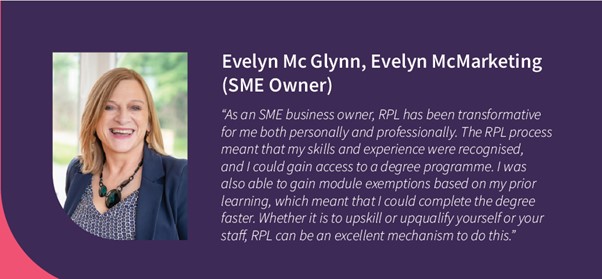Information for Enterprise
RPL recognises that learning is not limited to formal education settings, but takes place throughout our lives in everyday settings. Learning that takes place outside of formal education includes your employees ‘on-the-job’ learning.
By recognising the skills, knowledge and experience that your employees have gained in the workplace, RPL can be used as an invaluable tool to help address existing and emerging skills needs at a faster pace by avoiding duplication of learning.
TUS RPL for Enterprise aims to bring TUS together with local and regional enterprise to give value to informal and non-formal workplace learning in the context of the national framework of qualifications (NFQ).
Recognition of prior informal and non-formal learning could result in one of the following outcomes for your employees:
- Module exemption on a programme
- Advanced entry to a programme (to years other than year one)
- Entry to a programme
RPL could also result in cohorts of workers availing of programmes tailored to their specific skills needs and to the needs of the organisation.
Contact rpl@tus.ie for further information.
Download TUS RPL for Enterprise flyer
Benefits for Employers
RPL offers many benefits, particularly in a time of full employment in Ireland, when staff retention is an issue.
These benefits include:
- RPL can facilitate accelerated learning and upskilling/reskilling opportunities to meet current and future workforce needs at local, regional and national level.
- RPL may help to reduce the amount of time and cost associated with acquiring a qualification or credential.
- RPL supports staff development within organisations by increasing staff motivation to undertake appropriate education and training. As RPL acknowledges an employees learning, it can open up new learning opportunities.
- RPL can be used by individuals or groups of employees.
- RPL is a driver of workforce development.
- As well as supporting individuals’ career development, RPL can be a useful tool to address economic and societal challenges relating to green transition, digitalisation, automation and the skills needs associated with these.

Benefits for Employees
- Valuing and recognising prior learning may significantly improve individuals’ self-esteem and well-being.
- RPL enables widening participation in higher education by recognising the value of learning through in-house training and work experience.
- RPL may reduce the amount of time and cost required to acquire a qualification or credential and can have a positive impact on employees.
- Additional qualifications can lead to eligibility for promotion or new job opportunities, in some cases.




